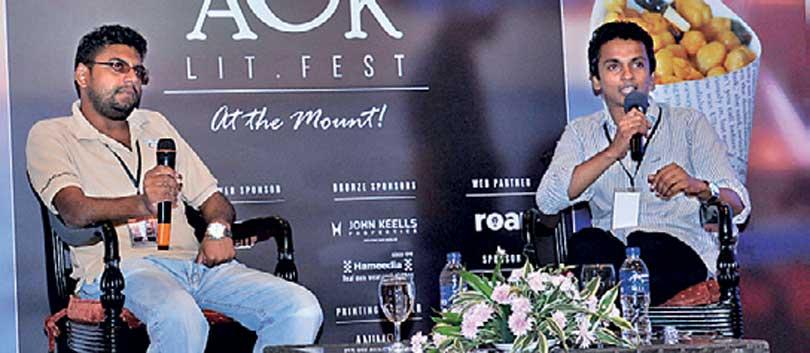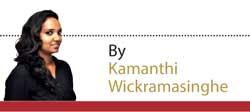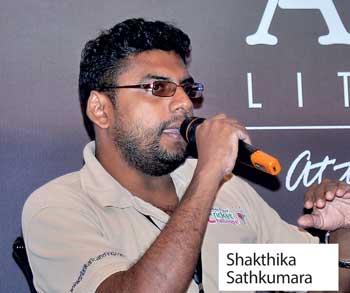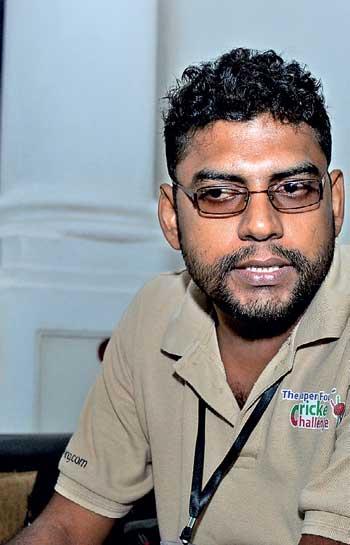Reply To:
Name - Reply Comment
Last Updated : 2024-04-18 17:22:00
Shakthika opens up on being a victim of censorship

Sathkumara (left) at the recent A&K Lit Fest
 ‘Niwahal Sithuvili Sithana Sithath Udarai’ reads the first stanza of Pandit W. D. Amaradeva’s popular track written by Dolton Alwis. It translates to “great is the mind of an independent thinker”. But for centuries, free-thinkers and those with creative ideas and rich imaginations were viewed as a threat to conventional society. Recently, post-modernist writer and poet Shakthika Sathkumara was arrested for expressing his creativity in black and white. His short story ‘Ardha’ or ‘half’, was attacked by factions of the Buddhist clergy who claimed it insulted Buddhism. Sathkumara was charged and remanded on non-bailable grounds under the International Covenant on Civil and Political Rights (ICCPR) Act. Ending his 130 days behind bars, Sathkumara is determined to fight for his rights and the freedom of expression.
‘Niwahal Sithuvili Sithana Sithath Udarai’ reads the first stanza of Pandit W. D. Amaradeva’s popular track written by Dolton Alwis. It translates to “great is the mind of an independent thinker”. But for centuries, free-thinkers and those with creative ideas and rich imaginations were viewed as a threat to conventional society. Recently, post-modernist writer and poet Shakthika Sathkumara was arrested for expressing his creativity in black and white. His short story ‘Ardha’ or ‘half’, was attacked by factions of the Buddhist clergy who claimed it insulted Buddhism. Sathkumara was charged and remanded on non-bailable grounds under the International Covenant on Civil and Political Rights (ICCPR) Act. Ending his 130 days behind bars, Sathkumara is determined to fight for his rights and the freedom of expression.

Literature, religion and censorship
At the recent A&K Lit Fest, Sathkumara opined that censoring literature and science came from religious institutions. “Certain ideas that benefited mankind were censored, be it literature or science. Creativity is imaginary, and it sets a precedent. People must have the right to imagine, and the right to express themselves,” he said.
He added that all religions sustained themselves through institutionalization. “Gautama Buddha criticised 62 religions in India. But he wasn’t taken to courts. It’s important to distinguish between criticism and defamation,” he noted. Sathkumara stressed that religion dragged people down and scared them to limit their imagination. “Religion never decided on the evolution of mankind or society. It is a barrier to a free-thinker. It leaves less space for innovation. Development happens because people think. People have been killed for criticizing the status quo. That’s what happened to Socrates, Copernicus and Galileo Galilei,” he said.
He contended that religious institutions tried to intimidate writers by taking them to courts. “We must battle our way through and win. Otherwise we will need approval from these institutions to write what we want,” he said. “There should be an attempt to establish freedom of expression through the law. In that case even Martin Wickremesinghe’s ‘Bawatharanaya’ has to be challenged and censored. Censoring happens when a society feels that some concept needs to be rejected. But this doesn’t apply to one’s thinking and writing. An idea could be criticised, but not by putting the writer behind bars,” he said.
Religion never decided on the evolution of mankind or society. It is a barrier to a free-thinker. It leaves less space for innovation.
He further said that people shouldn’t take writings based on fantasy personally.“If they take it personally, then I don’t think they are matured in their thinking. A work of literature can never declare war. But in history, religion and scientific beliefs have started wars. There’s a disparity among nationalities, ethnicities and castes as well. In Sri Lanka we think that Sinhalese form the majority and the others are minorities. But there can’t be a majority and a minority in a country. In 2009 when everybody was celebrating the war victory I wrote my first book of poetry titled ‘Wedi Wadunu Panhinda’ where I asked readers whether there was a winner in a war,” he said.
He opined that the Government did not take necessary action probably because religion was superior to the law. Although ‘Dathi Roden Upan Budun’ by Tennyson Perera was investigated by the CID and Manjula Wediwardena’s ‘Mary Nam Wu Mariya’ was censored, Sathkumara was the first to be imprisoned for his writing, making his impending case and judgment a historical one.
After the session, Sathkumara met with Daily Mirror to express his views on why it’s unacceptable to censor one’s imagination.
 Excerpts :
Excerpts :
Q What are the short stories and poems you wrote before ‘Ardha’?
I started writing in school. I first did A/L maths, but after I failed I studied arts and got a university placement. Some of my initial short story books include ‘Kalu Makara’, ‘Pathok Katu’, ‘Mini Kapannage Hardha Sakshiya’, ‘Weli’ and ‘Kuudu’. The final book I planned to launch was ‘Ardha’ but it was censored. I have also written several poetry books which have received several awards as well.
Q Were you targeted for these books as well?
In ‘Kalu Makara’ and ‘Pathok Katu’ there were two short stories titled ‘Gihi Charikawa’ and ‘Dharmadutha’ which were criticised by Buddhist monks and extremist groups. But they were only discussed.
Q Was ‘Ardha’ based on your imagination or on a true story?
Actually it talks about the Mahayana, Theravada and Hinayana sects of Buddhism.
Q Why do you take an interest in writing on Buddhism?
I’m a Buddhist. But I believe it to be more a philosophy than a religion. I have written several books based on Buddhism as well.
Q‘Ardha’ highlights child abuse among the Buddhist clergy. Such incidents were also reported from the Vatican. So why is it considered wrong to write about these issues in a book?
My book is not an insult to a religion. This is a work of art, and it blends a person’s experience and imagination. Therefore one cannot say whether it’s the truth. As such it’s something that lies in between reality and fantasy.
Q Why do you think only young artistes and writers stood up for you, and not veteran writers or the mainstream media?
Probably because they felt their jobs were more important. As I mentioned earlier, religion or religious extremism is superior to the law and governing structures.
Q Tell us about the challenges you faced when imprisoned.
I was in the Kegalle Prison which is on a 40 perch land and can accommodate only 200 prisoners. After 21 April, there were many Muslims arrested, and the numbers rose to 800. Nobody can imagine how I stayed. There were just six toilets for 800 people. We could come out only for two hours. While I was inside I wrote two more books. We had to sleep on a shift basis, and those 130 days were a challenge. Apart from that, I lost my job of seven years. Since I’m on bail I have to go to Polgahawela Police every two weeks and place my signature. This is quite stressful. On the other hand, I have to prepare for the case. The world is awaiting an answer as to the question whether this country has stooped to such levels as to imprison an artist for his or her work.
Q What challenges did your family endure during this period?
I have a son and daughter. My wife got together with everyone and fought the battle. It would have been easier to apologise and resolve the matter, but if that happened you may also have to apologise for something you write. It doesn’t have to happen that way. This is why I’m taking this struggle forward.
Q This government enacted the Right to Information Act and then there’s the ICCPR Act. Apart from your case, a woman was arrested for wearing a dress with a ship’s wheel design that was mistaken for a Dharmachakraya. In another instance, a woman from Trincomalee was arrested for wearing a saree that people thought had the Buddha’s face on it. What is your opinion on this situation?
Even I don’t understand how to explain it. One’s dress is a form of expression. That Dharmachakraya was a ship’s wheel, and that saree had the face of a deity worshiped in Jainism. Malaka Dewapriya has also been questioned. His radio drama is titled ‘Nihon Sapa Labewa’, and Nihon is a concept in Japan. Extremists don’t even try to find the actual meanings of these concepts and they try to act smart. I also don’t understand why the Government is allowing such people to act freely. So people can now see how religion has drawn boundaries on their freedom to live.
QThere are many young writers who like to challenge the status quo and think radically. What is your advice to them?
If we don’t fight for the freedom of expression, another person will have to face the same struggle I’m enduring in a different way. On the other hand, I believe that religious extremism emerges when a society doesn’t allow critical dialogue. Therefore we need to set a precedent for it. If we start to love one another, as well as the environment, all other values would be safeguarded.

Add comment
Comments will be edited (grammar, spelling and slang) and authorized at the discretion of Daily Mirror online. The website also has the right not to publish selected comments.
Reply To:
Name - Reply Comment
On March 26, a couple arriving from Thailand was arrested with 88 live animal
According to villagers from Naula-Moragolla out of 105 families 80 can afford
Is the situation in Sri Lanka so grim that locals harbour hope that they coul
A recent post on social media revealed that three purple-faced langurs near t

10 Apr 2024
09 Apr 2024